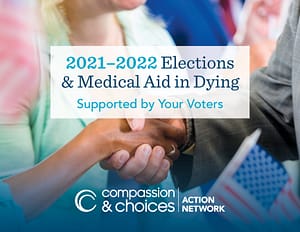In 2021 and 2022, our country entered a new phase in its response to COVID-19. Vaccinations, boosters and the cautious reopening of public spaces and resumption of personal interactions signaled a redefinition of healthcare and end-of-life care. Legislatures across the country debated familiar policies and pending bills, but from a post-COVID perspective. And legislators heard testimony from voters who had their own priorities. The pandemic brought a deeper understanding of the fragility of our lives and the importance of ensuring all Americans have the full range of end-of-life care options, including medical aid in dying as an option for terminally ill adults to peacefully end unbearable suffering.
Since 1994, ten states and Washington, D.C., have authorized medical aid in dying. Extraordinary momentum during the last five years (seven authorizations) continued into 2021–22, right through the most challenging days of the pandemic.
In 2021, Compassion & Choices, the Compassion & Choices Action Network and the New Mexico End-of-Life Options Coalition made history with passage of the Elizabeth Whitefield End-of-Life Options Act. Despite obstacles created by the COVID-19 public health crisis — or perhaps because of them — lawmakers responded to the will of the majority of New Mexico residents by passing legislation to give eligible terminally ill adults the option of medical aid in dying. Gov. Michelle Lujan Grisham signed the bill into law on April 8, 2021.
Over the course of the 2021 and 2022 legislative sessions, 414 lawmakers from both sides of the aisle, in 26 legislatures in every region of the country, introduced or signed onto medical aid-in-dying bills as sponsors or co-sponsors.
What’s clear from the data on two successive election cycles: there is little impact on re-election prospects for state legislative aid-in-dying bill sponsors. The re-election rate for 2018 was 92%; it increased to 95% in 2020 and held steady at 95% for 2022.
Constituents across the nation are thanking and reaffirming their lawmakers for introducing and supporting legislation that promotes patient autonomy by authorizing the practice of medical aid in dying.







